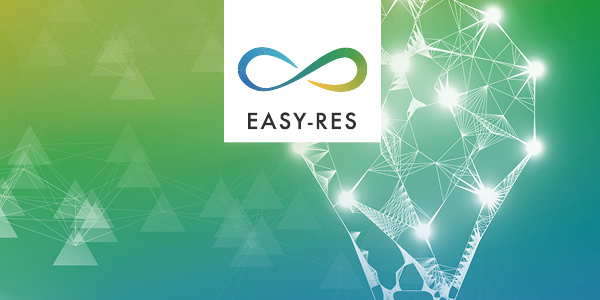
EASY-RES Summer School 2021
EASY-RES will be hosting a virtual Summer School from 20th to 24th September 2021. The Summer School titled “Enabling DRES to offer Ancillary Services” is a 5-days PhD-level program and comprises 13 parts. The course content will be taught by the academic partners of EASY-RES with contributions from the project’s industrial partners. The course is provided free of charge and will be delivered fully online via Zoom.
Where can I find more information about the EASY-RES Summer School?
You can download the Summer School Brochure to find more information.
Where can I register for the Summer School?
You can register for the Summer School here. Registration will be open until 16th September 2021.
Who can register for the Summer School?
Anyone interested in the topics of the EASY-RES Summer School can register for the course.
What is the content of the Summer School?
The aim of the Summer School “Enabling DRES to offer Ancillary Services” is to present new methods for controlling the Distributed Renewable Energy Sources (DRES), which are connected in a distribution grid, so that they can offer several existing and new ancillary services (AS) following a bottom-up approach: from DRES to distribution systems and from distribution systems to transmission systems. In addition, methods for aggregating frequency related AS in order to be offered to the transmission system are presented. Fundamental as well as advanced concepts are covered.
Which specific topics will be covered by the Summer School?
- The basics of grid stability and frequency deviations
- The basics of voltage regulation in distribution grids
- New control methods of converter interfaced DRES so that they can exhibit, in a unified manner,
- Fully controllable, true inertial response independent of their loading condition
- Primary Frequency Response (PFR)
- Extended fault-ride-through (FRT) and proper reaction during grid faults in order to assist the legacy protection systems
- Active power ramp rate limitation (RRL)
- Aggregation of inertial and PFR at distribution system level
- Methods to derive the equivalent dynamic models of whole distribution grids
- Methods for near optimal voltage regulation in MV and LV distribution grids based only on the reactive power capability of DRES
- The quantification and measurement of the various AS
- The structure of the required ICT system for the control of the DRES and their AS
- Testing methods for validation of the ability of DRES to offer the AS
- Existing and new roles for Battery Energy Storage Systems (ESS) in the frame of AS and their Market Integration/Potential Economic Value.
What is the timetable of the Summer School?
You can view the timetable of the Summer School here. The time corresponds to Central European Summer Time (CEST).
Picture by peshkova on AdobeStock.
